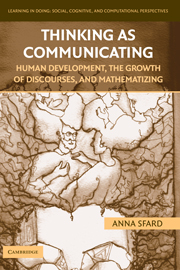25 results
23 - Research in Mathematics Education
- from Part V - Learning Disciplinary Knowledge
-
-
- Book:
- The Cambridge Handbook of the Learning Sciences
- Published online:
- 14 March 2022
- Print publication:
- 07 April 2022, pp 467-485
-
- Chapter
- Export citation
Contributors
-
-
- Book:
- The Cambridge Handbook of the Learning Sciences
- Published online:
- 05 November 2014
- Print publication:
- 17 November 2014, pp xv-xviii
-
- Chapter
- Export citation
27 - Research in Mathematics Education
- from Part V - Learning Disciplinary Knowledge
-
-
- Book:
- The Cambridge Handbook of the Learning Sciences
- Published online:
- 05 November 2014
- Print publication:
- 17 November 2014, pp 545-564
-
- Chapter
- Export citation
3 - Commognition: Thinking as Communicating
-
- Book:
- Thinking as Communicating
- Published online:
- 27 July 2009
- Print publication:
- 21 January 2008, pp 65-93
-
- Chapter
- Export citation
Subject Index
-
- Book:
- Thinking as Communicating
- Published online:
- 27 July 2009
- Print publication:
- 21 January 2008, pp 322-324
-
- Chapter
- Export citation
8 - Explorations, Deeds, and Rituals: What We Mathematize For
-
- Book:
- Thinking as Communicating
- Published online:
- 27 July 2009
- Print publication:
- 21 January 2008, pp 222-260
-
- Chapter
- Export citation
4 - Thinking in Language
-
- Book:
- Thinking as Communicating
- Published online:
- 27 July 2009
- Print publication:
- 21 January 2008, pp 94-124
-
- Chapter
- Export citation
Glossary of Commognition
-
- Book:
- Thinking as Communicating
- Published online:
- 27 July 2009
- Print publication:
- 21 January 2008, pp 295-302
-
- Chapter
- Export citation
Acknowledgments
-
- Book:
- Thinking as Communicating
- Published online:
- 27 July 2009
- Print publication:
- 21 January 2008, pp xxi-xxiv
-
- Chapter
- Export citation
Part I - Discourse on Thinking
-
- Book:
- Thinking as Communicating
- Published online:
- 27 July 2009
- Print publication:
- 21 January 2008, pp 1-2
-
- Chapter
- Export citation
Titles in the series
-
- Book:
- Thinking as Communicating
- Published online:
- 27 July 2009
- Print publication:
- 21 January 2008, pp 325-326
-
- Chapter
- Export citation
2 - Objectification
-
- Book:
- Thinking as Communicating
- Published online:
- 27 July 2009
- Print publication:
- 21 January 2008, pp 34-64
-
- Chapter
- Export citation
Part II - Mathematics as Discourse
-
- Book:
- Thinking as Communicating
- Published online:
- 27 July 2009
- Print publication:
- 21 January 2008, pp 125-126
-
- Chapter
- Export citation
7 - Routines: How We Mathematize
-
- Book:
- Thinking as Communicating
- Published online:
- 27 July 2009
- Print publication:
- 21 January 2008, pp 195-221
-
- Chapter
- Export citation
9 - Looking Back and Ahead: Solving Old Quandaries and Facing New Ones
-
- Book:
- Thinking as Communicating
- Published online:
- 27 July 2009
- Print publication:
- 21 January 2008, pp 261-294
-
- Chapter
- Export citation
6 - Objects of Mathematical Discourse: What Mathematizing Is All About
-
- Book:
- Thinking as Communicating
- Published online:
- 27 July 2009
- Print publication:
- 21 January 2008, pp 163-194
-
- Chapter
- Export citation
5 - Mathematics as a Form of Communication
-
- Book:
- Thinking as Communicating
- Published online:
- 27 July 2009
- Print publication:
- 21 January 2008, pp 127-162
-
- Chapter
- Export citation

Thinking as Communicating
- Human Development, the Growth of Discourses, and Mathematizing
-
- Published online:
- 27 July 2009
- Print publication:
- 21 January 2008
Frontmatter
-
- Book:
- Thinking as Communicating
- Published online:
- 27 July 2009
- Print publication:
- 21 January 2008, pp i-vi
-
- Chapter
- Export citation
Contents
-
- Book:
- Thinking as Communicating
- Published online:
- 27 July 2009
- Print publication:
- 21 January 2008, pp vii-x
-
- Chapter
- Export citation



